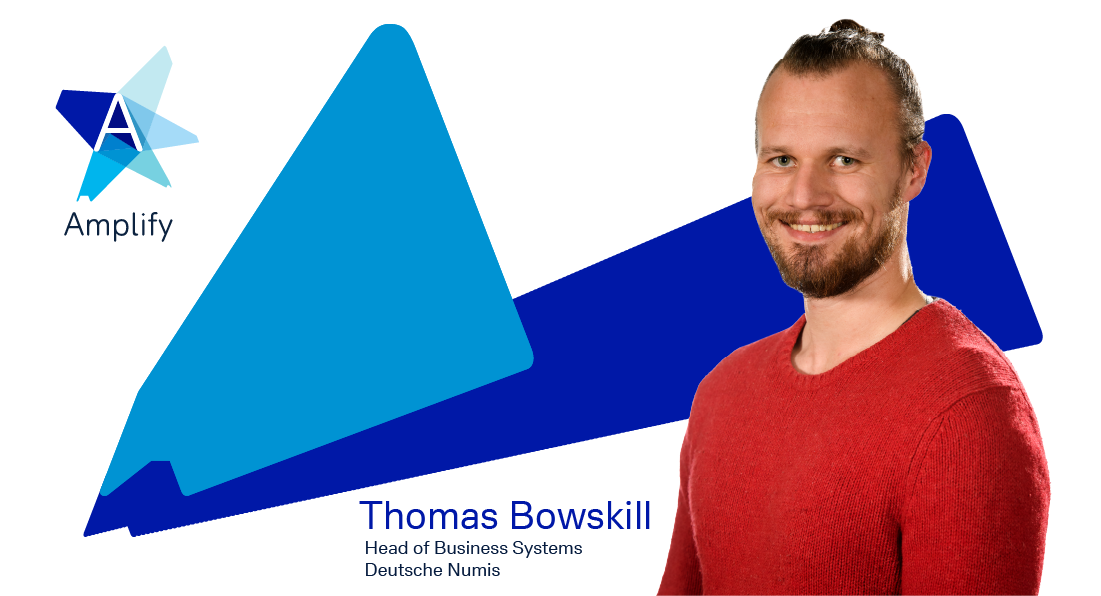-
BackWhat we doNumis is an ambitious, dynamic and innovative investment bank, driven to excel across all aspects of its delivery.Investment Banking
-
BackLatest newsRead the latest news about our business, our people and our work, find out about our next events and conferences.News
-
BackWho we areOur collaborative environment and distinctive way of excelling , is nothing without our great people.
-
BackOur board
Tom Bowskill
“Neurodiversity is all about having a blend of perspective … What we want is combinations of people with different skills who can work together to leverage their strengths and support their weaknesses.”

Our Amplify series shares some of the unique perspectives of colleagues from around Deutsche Numis and celebrates the impact they are having on clients, our teams or the wider community.
For the next in our series, we speak with Thomas Bowskill about his wide range of responsibilities as a business analyst, as well as his wonderful work raising awareness and support for neurodivergence.
Can you explain what you do at Deutsche Numis and how this helps our clients?
I’m a Business Analyst by background, but that term can mean a broad range of things! Essentially, my team is responsible for ensuring we get value out of the applications and technology we have in the bank. This can range from introducing new systems to retiring legacy technology and involves close partnership with the business. This collaboration is key – it’s not enough to just deliver a system and call it a job well done; my team is centred on making sure the business gets along with the systems they have so we can unlock maximum value for our clients.
How did you end up choosing to work in this area and at Deutsche Numis in particular?
I love variety. My role has always been about transforming organisations. This often involves working with business lines and technologies I’m not familiar with. There’s something exciting about starting out knowing nothing about something, learning about it and then delivering value.
I spent six years at Deutsche Bank, working on fixed income repo systems (which facilitate the sale and repurchase of bonds to collateralise them), before moving to Numis, where I was presented with a whole new asset class in equities, multiple departments, and a wide array of systems to learn. The company had only just started to hire business analysts, so it was a very exciting prospect.
What changes have you seen in your field over the course of your career?
There’s a temptation to cite multiple emerging technologies, but the job of a business analyst is about embracing and reacting to change. So I’d say the changes are more around how we approach change, rather than what is changing. The ‘agile’ approach to development has really grown since I first started in the City. It’s a common-sense approach to delivering change bit-by-bit, rather than in one monolithic ‘waterfall’ project. The challenge this introduces to the role of a business analyst is that solutions can be skewed towards short-term wins, with the legacy ignored. I find this topic so interesting that I’ve written an article on this subject, which is shortly to be published in BA Digest magazine.
What has inspired you to stay at Deutsche Numis for as long as you have (six years)?
The people and the culture. There’s a true sense of a flat structure in how we work, with autonomy, respect and recognition being at the heart of it. You’re able to make changes. We’ve got quite a light footprint as a team, and I love the challenge this brings of handling so many varied issues.
Do you have any mentors or role models?
Mentoring is a big thing for me. I’ve had several official mentors, and others in a more unofficial capacity. In recent years, my former manager Videll – who is still at DB! – has been a massive influence in my career. I have also really enjoyed being a mentor myself to those at an earlier career stage.
In terms of role models, if I am allowed to mention a fictional character, I would have to say Sherlock Holmes! His approach to life really resonates with me, in particular his ‘attic theory’, whereby he likens the brain to an empty attic of finite storage space and it is therefore important to fill it only with items that will be of most use in your daily life.
You have been a real advocate for neurodiversity inclusion – why has it been so important for you to raise awareness of this?
I was diagnosed as autistic a few years ago, and a lot of things clicked for me off the back of it. Most critically, it was the realisation of how lucky and privileged I am to be in the (horribly named) ‘high functioning’ category. Despite school being an incredibly challenging time, I managed to build a strong career working with my autism. I’m conscious that many others do not have this privilege, so I feel compelled to dispel a lot of misconceptions about neurodivergences.
The diagnosis has been helpful in understanding why some things are so debilitating for me, how I can manage my triggers and knowing more about pathological demand avoidance (resistance to doing something that is requested or expected of you), aphantasia (inability to see mental images) and the interoception issues I have (not feeling hunger, temperature, pain, etc).
Have you felt any negative impact on your career progression from your own neurodivergence?
Honestly, it’s hard to say. I have been told by a few people that I might not want to be as open about it on LinkedIn, as it could damage my career prospects, but when it comes to Deutsche Numis I don’t feel held back. I’d be surprised if being openly autistic opened more doors than it closed, though.
Are there any areas where you feel the industry could do more to support those who are neurodivergent?
Sometimes I refer to us neurodivergent folk as having ‘left-handed brains’. The workplace has everything built for those right-handed. Sure, we can adapt to things, but that is at a detriment to us. The biggest thing someone can do to be supportive is simply to stop and ask someone what they need. For example, a dyslexic team member might not be able process information on the fly – so instead, consider giving them information prior to any detailed conversations. Or for me with aphantasia it means designing things is not my forte at all – ask me to create something visually at your own peril!
As mentioned, you post about the topic on LinkedIn, drawing attention to some of the advantages neurodiversity has to offer, would you like to expand on this here?
There’s this concept of ‘spiky profiles’ commonly found in those who are neurodivergent. I have areas of very high intellectual capability and areas of very low capability. Someone who is neurotypical will be less spiky.
Neurodiversity is all about having a blend of perspective – if you have three neurotypical people working together, it has the same lack of neurodiversity as three autistic people working together. What we want is combinations of people with different skills who can work together to leverage their strengths and support their weaknesses. I often find I work very well with people with ADHD, because we share many traits, but also compliment each other’s weaknesses well and can cope with how ‘intense’ we all are.
You also raise awareness around mental health issues, is this another area where you feel there could be more support in place?
Certainly. I think teams should check in with each other every day, just to ensure things are going well. I also think there should be a much wider adoption of Mental Health First Aid training. From growing up with a bipolar father and having a lot of mental health struggles myself, I know how difficult it can be to approach people. If a team has no one they know closely who has Mental Health First Aid training, then they should address that.
Then there’s also the lack of general support that exists for autism and mental health. I’m in a category of people nine times more likely to die by suicide, but as a ‘chronic condition’ most healthcare providers won’t cover it. I think this will become a growing problem for companies supporting neurodiversity and mental health awareness, as it doesn’t match the message.
Why do you think diversity within business is important?
I think a lack of diversity shows something inherently unhealthy in an organisation. Healthy companies – and healthy societies – need diverse representation; otherwise, it just becomes a collective group think, where the same perspectives, biases and ignorance become the accepted norm. Diversity adds value, and organisations that don’t seek it aren’t doing so for any healthy reasons.
How do you think we can attract more neurodivergent candidates into the industry?
A lot of it starts at the early years. Neurodivergent candidates with degrees have already survived the gauntlet that is navigating the school system – they’re going to be applying for roles and likely getting them. It’s the numerous others who are burnt out by the educational system in the earlier years that we should consider how to support. We need to ensure they are aware of what opportunities exist for them and how to start down the path to take advantage of these.
What advice would you give to neurodivergent candidates looking to get into the industry?
Be yourself and don’t contort yourself to fit the mould, as you will supress the value you can bring.
Are you involved, or hoping to get involved, with some of the new opportunities at DB around diversity?
Hopefully so. I’ve made a couple of outreaches and am keen to see what opportunities there are. I am especially interested to find out more about the Neurodiversity Network, one of the dbEnable ERG pillars.
What is the one change you would like to see to make work life easier for neurodivergent colleagues?
What a question to end on! I’d probably say empathy and understanding. Consider that, if you are making no adjustments for them – and are only treating them as you want to be treated – then you’re contributing to an environment that disables them. Instead, think about treating someone they way they need to be treated, which might be different to you.




